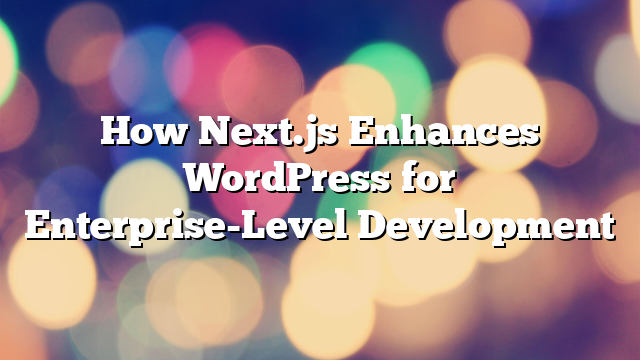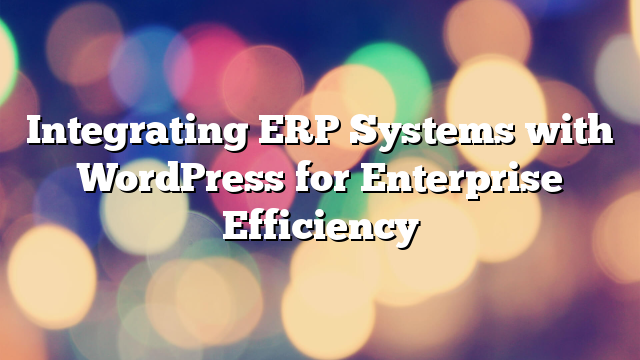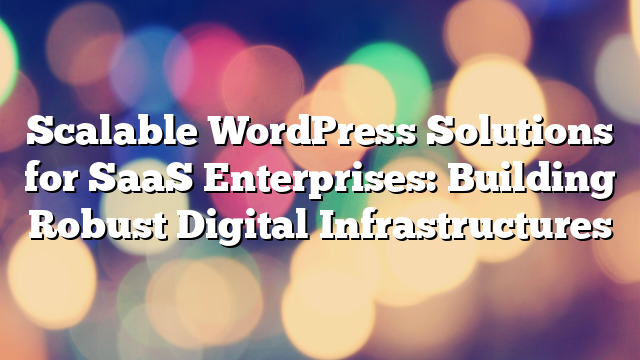How Next.js Enhances WordPress for Enterprise-Level Development
08.12.2024

Enterprises are increasingly turning to modern web technologies to enhance their digital platforms. One such trend is the integration of WordPress with Next.js, a React-based framework renowned for its performance and flexibility. By combining the robust content management capabilities of WordPress with the advanced features of Next.js, enterprises can deliver high-performing, scalable, and user-friendly websites. In this article, we’ll explore the advantages of using Next.js with WordPress for enterprise-level development and how it transforms traditional web experiences.
What is Next.js?
Next.js is a React framework designed for building server-rendered and statically generated web applications. It provides features like hybrid static and server-side rendering (SSR), optimized performance, and easy scalability. These qualities make it an ideal partner for WordPress, especially in scenarios where speed, flexibility, and SEO are critical.
Benefits of Integrating Next.js with WordPress
1. Enhanced Website Performance
Next.js focuses on delivering lightning-fast websites through optimized page rendering. By using static site generation (SSG) or server-side rendering, content is preloaded or dynamically rendered, ensuring faster load times and a seamless user experience.
2. Improved SEO
Search engine optimization is crucial for enterprise websites. Next.js provides server-side rendering capabilities, ensuring that content is easily indexed by search engines. This enhances visibility, improves rankings, and drives organic traffic.
3. Scalability for Growing Needs
Enterprise websites often need to handle high traffic volumes and expanding content. Next.js offers a scalable solution by efficiently managing resource-intensive tasks like rendering and caching, ensuring consistent performance regardless of traffic spikes.
4. Flexibility in Frontend Design
With Next.js, developers have complete control over the frontend, enabling them to create unique, interactive designs without being constrained by traditional WordPress themes. This ensures a tailored user experience that aligns with brand goals.
5. Headless Architecture Compatibility
Next.js works seamlessly with headless WordPress setups. By using the WordPress REST API or GraphQL, enterprises can manage content in WordPress while delivering it through a modern, decoupled frontend built with Next.js.
6. Enhanced Security
Decoupling the frontend from the backend reduces the attack surface, as users only interact with the Next.js application. This minimizes exposure to common WordPress vulnerabilities like brute force attacks or unauthorized access.
7. Developer-Friendly Workflow
Next.js offers a streamlined development process with built-in features like hot module replacement, file-based routing, and API routes. This allows developers to focus on creating high-quality, enterprise-grade applications quickly and efficiently.
Use Cases for Next.js and WordPress Integration
1. Corporate Websites
Large enterprises can use Next.js to create highly customized and fast websites that showcase their brand while leveraging WordPress for centralized content management.
2. E-Commerce Platforms
By integrating Next.js with WooCommerce, enterprises can create fast and dynamic e-commerce sites with advanced frontend features, improving the shopping experience for customers.
3. Multi-Language Websites
Next.js simplifies the creation of multilingual websites by offering tools for internationalization (i18n). Enterprises can use this feature to deliver localized content globally, enhancing user engagement.
4. Content-Rich Platforms
Media companies or blogs with extensive content libraries benefit from the performance and SEO advantages of Next.js, combined with WordPress’s easy content management capabilities.
Challenges of Next.js and WordPress Integration
1. Increased Development Complexity
Combining two platforms requires expertise in both WordPress and modern frontend frameworks like React. Enterprises may need skilled developers to handle the integration effectively.
2. Hosting Requirements
Next.js applications often require specialized hosting solutions, such as Vercel or Netlify, which might increase operational costs compared to traditional WordPress hosting.
3. API Dependency
The integration relies heavily on the WordPress REST API or GraphQL. Any issues with the API can affect the performance and functionality of the website.
Best Practices for Implementing Next.js with WordPress
1. Plan the Architecture
Define the goals of the integration and plan the architecture carefully. Decide whether to use static site generation, server-side rendering, or a combination of both based on your enterprise’s needs.
2. Optimize API Performance
Use caching and efficient query techniques to reduce API call frequency and improve performance. Tools like WPGraphQL can simplify and optimize data retrieval.
3. Choose the Right Hosting
Select a hosting provider that supports Next.js applications, such as Vercel, AWS, or Netlify, to ensure seamless deployment and scalability.
4. Ensure Security
Secure the WordPress backend with strong authentication, role-based access control, and regular updates. Use HTTPS to encrypt API communications between WordPress and Next.js.
5. Test Before Deployment
Thoroughly test the integrated setup in a staging environment to identify and resolve any issues before going live. Monitor performance and API responses to ensure smooth operation.
Conclusion
Integrating Next.js with WordPress unlocks new possibilities for enterprise-level web development. The combination of WordPress’s robust CMS capabilities with Next.js’s advanced frontend features offers a powerful solution for businesses aiming to create fast, scalable, and SEO-friendly websites. While the integration requires careful planning and expertise, the benefits it provides make it a worthwhile investment for enterprises looking to enhance their digital presence.
Looking to implement Next.js with WordPress for your enterprise? Contact AllWebDev today and let us help you create a cutting-edge web solution tailored to your needs.



